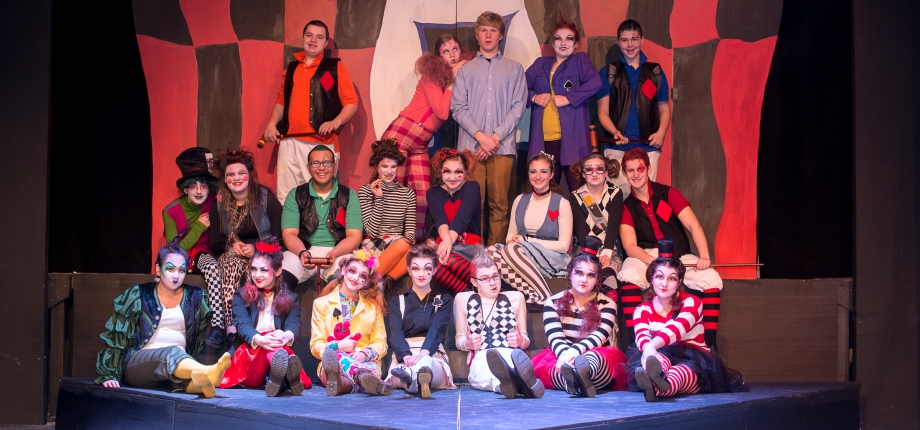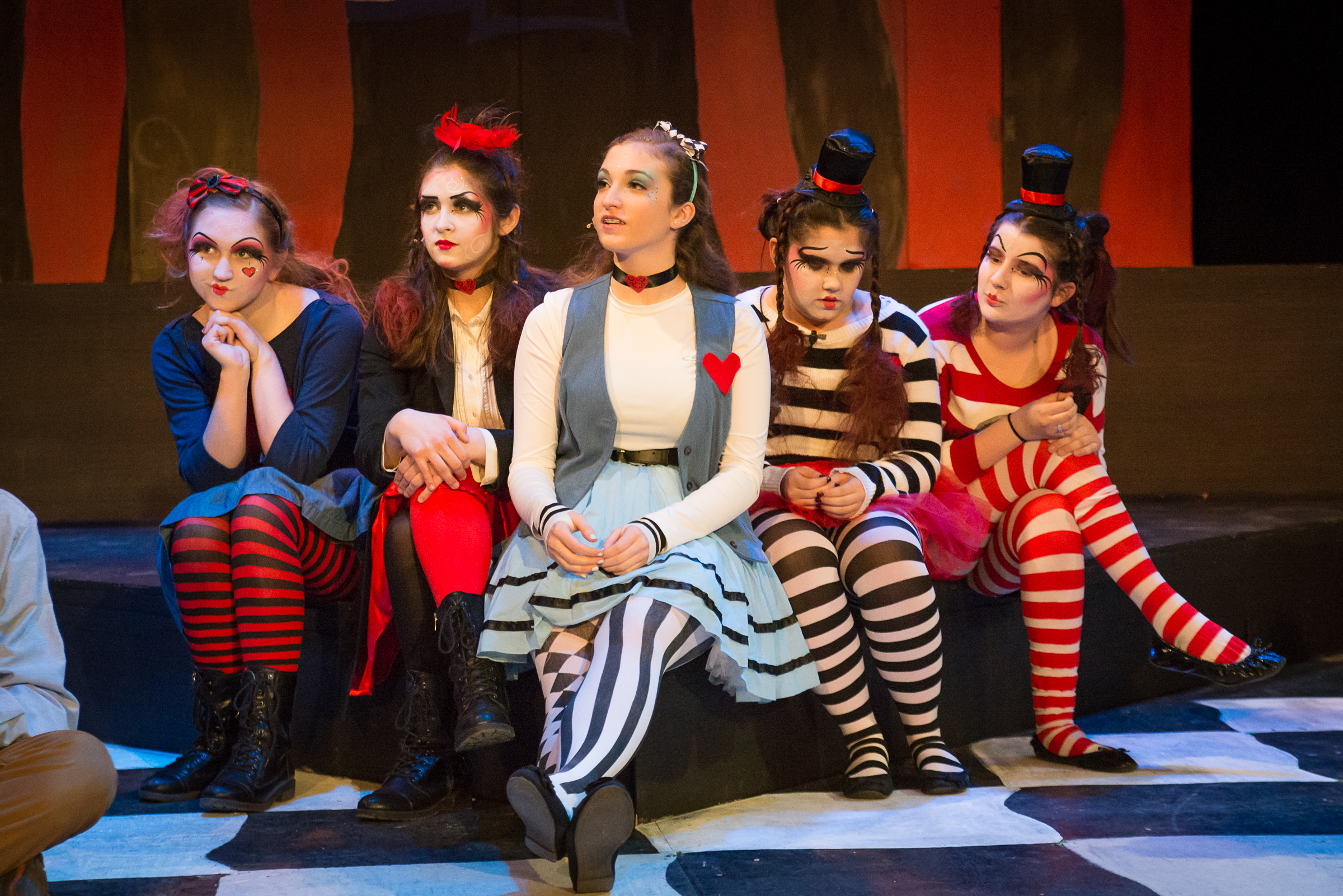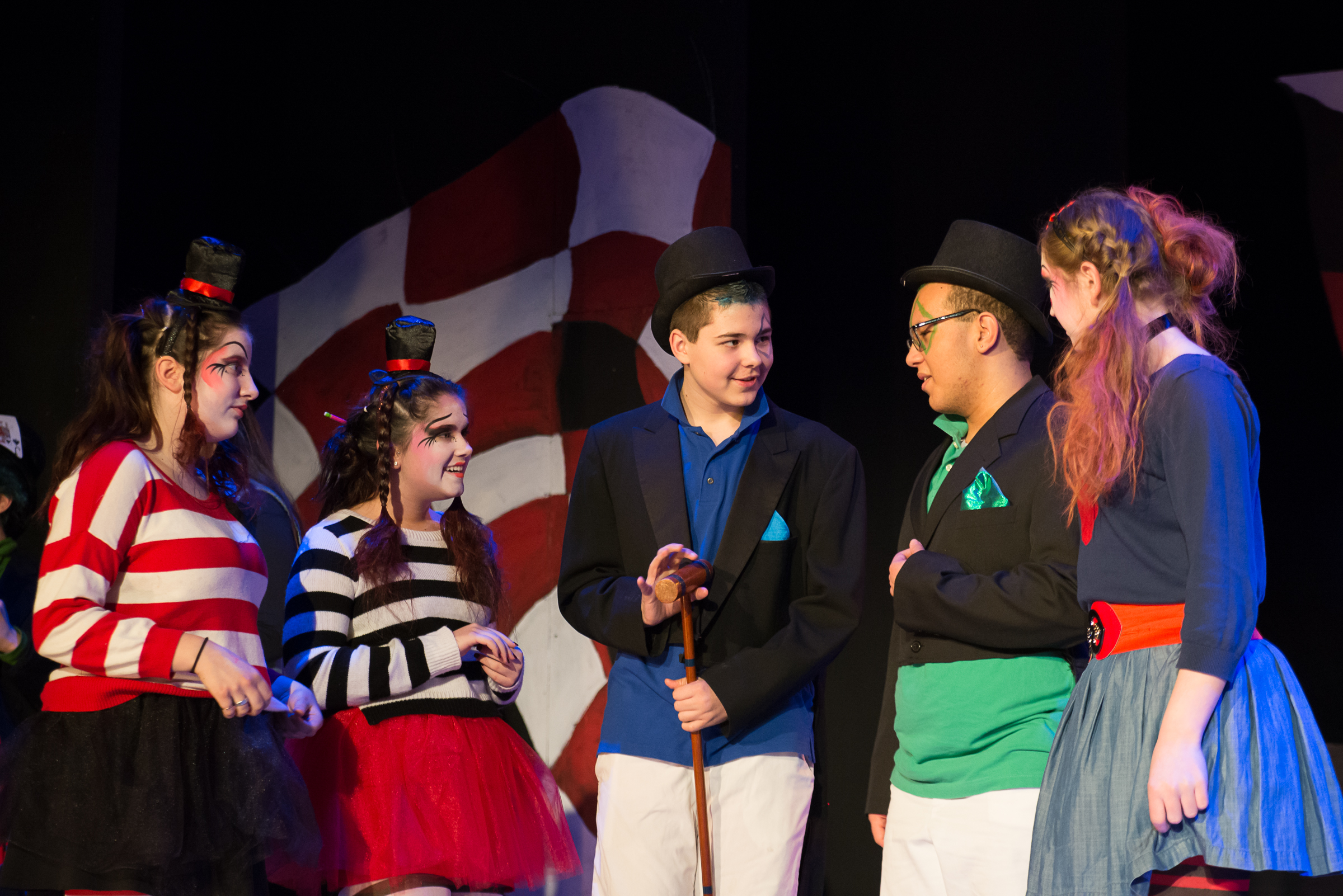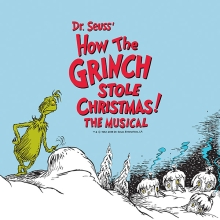Filichia Features: Say Hi to Wonderland High

Filichia Features: Say Hi to Wonderland High
While you’re waiting to do Wicked (for which you shouldn’t hold your breath or your high hopes), consider staging Wonderland High.
Like Wicked, Wonderland High is based on a famous story: Lewis Carroll’s 1865 hit Alice in Wonderland. More to the point, the musical whose book was co-written by James Merillat and Jesse David Johnson also deals with an issue found in Wicked:
Popular? Can Arthur be pop-uu-lar?
The poor kid has just moved from Kansas City to an unnamed town where he’ll spend his senior year at Wonderland High. He would have been a Big Cheese at his previous high school, but now he’s a mere Baby Gouda.
Merillat knows how Arthur feels. “When I moved to New York at 22, it was the 23rd move I made in my life,” he says dolefully. No, his parents weren’t on the lam; his father worked for the government which resulted in a peripatetic life.
“We even lived on the hill in Colorado where The Shining was filmed,” he says.
So like Arthur, he spent a part of his high school years in Kansas City -- well, until his parents told him, “Next stop, Ellicott City, Maryland.” So Merillat knows better than most that if you suddenly show up one September morn at a new high school, the gym will most certainly not be decorated with signs that proclaim “Welcome, New Kid!”

KISS Theatre Company's production of Wonderland High (Photo by Michelle Fitz Photography)
Johnson can relate on another level. The Roswell, New Mexico native says “I was not a popular kid in high school. The drama club is where I found like-minded people.”
It also led Johnson to becoming MTI’s is Associate Director of Amateur Licensing. That means that he’ll occasionally (or more than occasionally) be making arrangements with various schools and clubs to do his own musical.
Whatever Merillat and Johnson endured in high school, their troubles were far less discombobulating than what awaits Arthur in Wonderland High. Football isn’t the big sport here; croquet is. Every Wonderland Lobsters team for 40 straight years has made chicken croquettes out of the competition.
So one of the first questions Arthur’s asked when he arrives is “Can you play?” But Arthur, like many of us, just isn’t into croquet. That gets him many “What’s wrong with you?” stares. Worse, Paul – the team’s captain – is ready to pummel Arthur into submission. As our New Boy moans in one of the script’s wittiest lines, “I don’t think I’m in Kansas City anymore.”
Yes, Arthur, not Alice, plays the role of the confused stranger in a strange land. That was Merillat’s intention. “I’ve been intrigued with Carroll’s work since I saw the Disney animated feature as a child,” he says. “As much as I loved it, I did see one flaw: Alice doesn’t want anything. She’s a passive observer who isn’t particularly changed by her experiences in Wonderland.”
So Merillat and Johnson have ensured that Arthur wants two things: acceptance and Alice, who’s head of the cheerleaders (the Quadrilles, of course). But how can a nobody such as he even dream of getting her as his girlfriend? Although Alice is pleasant to him, he soon realizes that she sees him as merely another vote that could help her become Lobster Queen of the Cotillion. The show reinforces what pressure teen boys have before asking out a girl, as they risk rejection and humiliation.
Besides, Alice has been following the template that’s been in place since high schools came into existence: she as head cheerleader and Paul as star athlete just have to wind up together. Yet we’re surprised when Alice observes “I have Paul, but not quite love.” That spark of introspection makes us care about her.
We can’t say the same for Paul, who believes the reason for a cotillion is that the croquet team has won the title “a cotillion times.” Whether he’s being ironic or moronic is up to the director, but we have every reason to assume that Paul’s I.Q. is lower than the number of performances that In My Life played on Broadway.
The show was Merillat’s idea. “Because I worked for MTI (as director of marketing and promotion) during the time of High School Musical, I wanted to write something for high-schoolers,” he says. “There aren’t many shows in which kids can play characters their own age.”
Doing something female-centric was also a goal. “There are only six guys necessary, and only three of them must sing,” he says. “All the characters are broadly drawn so they’re fun to play, and the cast can be racially diverse, too. We’ve seen productions with an Asian Alice and an African-American Arthur.”

KISS Theatre Company's production of Wonderland High (Photo by Michelle Fitz Photography)
The two kiss, but the creators are still stunned by an Ohio production where a serious and very long kiss didn’t get the usual mocking “Ooooooooooooooooohhhh!” from students who have yet to embrace maturity. “I guess,” says Merillat, “that when Alice and Arthur get together, everyone’s happy for them. For the entire length of the show, you want Alice to be a better person and Arthur not to feel inept. It has a good message, too, about being kind -- and it’s very anti-bully, too.”
And, to be frank, Wonderland High tells the truth about conformity. “You’ll sing the songs we sing,” the students demand of Arthur in Johnson’s lyrics that permeate Merillat’s soft-pop-rock music: “The cool kids set all the rules” … “We care more if the home team plays than we do about G.P.A’s.” … “You’ll end up being labeled a freak” … “Your P.O.V. is worthless here.” Yes, Wonderland High isn’t afraid to tell it like it is -- especially when one girl says she was late because “I had to help a freshman out of a locker.”
There won’t be many high-schoolers who won’t recognize Allison, whom Alice believes to be her best friend but is really her worst enemy. With Arthur, she’s willing to show her true face and brassily come down to brass tacks: “Everyone wants to be me,” she tells him, “and no one wants to be you.”
That’s especially true when Arthur is revealed as a Shakespeare fan, which may surprise some teen attendees at Wonderland High. Be that as it may, one girl does admire him for his ability to decipher Elizabethan language. “Shakespeare’s hard,” she says -- only to have Allison respond with “Paul’s body is hard; Shakespeare’s just stupid.” And when another girl says of Arthur “I think he’s cute,” Allison immediately chastises her with “But he’s not on the team.”
Alice is no saint, either. When Dr. Bloom must leave the room during a test and tells the students to observe “the honor system,” Alice shows she has a little Tevye in her when she tells her fellow students that “There’s no honor in cheating, but there’s no honor in failing, either.” Allison is less oblique: “If everyone does it, it’s not wrong.”
Alice is caught, but Arthur takes the blame. (That’s what it is to be young.) Bloom sees through it, however. “You’re starting fresh here,” she tells Arthur. “You can be whomever you want to be.”
That’s good advice – and a much more positive look – at what you can do when you move to a different school. Oh, you’ll still run into the games teens play with each other (and I don’t mean croquet), which are previews of coming attractions of the games that adults play with each other.
Best of all, Wonderland High reminds us that teachers aren’t just there to impart that cosine zero equals one, but are available to dispense valuable advice. There’s profound wisdom in Bloom’s belief that high school involves “a strange time when young adults are just figuring out who they might become – and a great time when they don’t actually have to make a choice.”
Adults, do, however, need to choose – especially directors. Here’s predicting that plenty will be opting for Wonderland High in the years to come.
Watch the Trailer for Wonderland High
You may e-mail Peter at pfilichia@aol.com. Check out his weekly column each Monday at www.broadwayselect.com, Tuesday at www.masterworksbroadway.com and Friday at www.kritzerland.com. His book The Great Parade: Broadway’s Astonishing, Never-To-Be Forgotten 1963-1964 Season is now available at www.amazon.com.

























